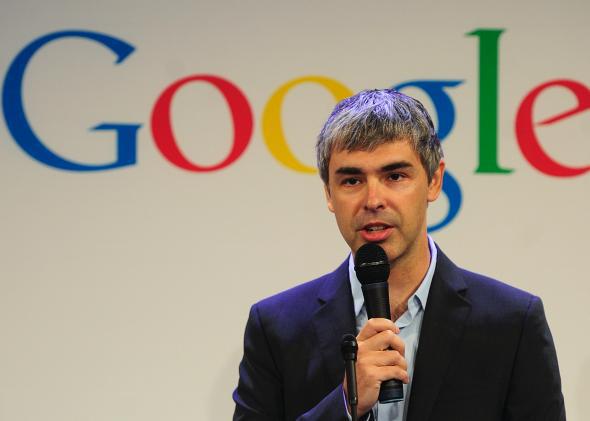This post first appeared in Business Insider.
Google CEO Larry Page recently participated in a fireside chat with Khosla Ventures, where among other things he offered his view on the state of the economy and labor.
People are endlessly musing on the future of the labor market these days, given the idea that robots can perform more and more jobs that were once thought to be the sole domain of humans, and because tech-enabled productivity has enabled a few lucky people to reap huge fortunes with relatively few workers.
In light of this, Page wonders why everyone is working so much, and he suggests that perhaps people don’t need to work themselves to the bone, since it’s relatively easy for a modern society to fulfill most people’s basic necessities.
Here’s part of his comments:
I totally believe we should be living in a time of abundance, like Peter Diamandis’ book.
If you really think about the things that you need to make yourself happy—housing, security, opportunities for your kids—anthropologists have been identifying these things. It’s not that hard for us to provide those things. The amount of resources we need to do that, the amount of work that actually needs to go into that is pretty small. I’m guessing less than 1 percent at the moment.
So the idea that everyone needs to work frantically to meet people’s needs is just not true. I do think there’s a problem that we don’t recognize that. I think there’s also a social problem that a lot of people aren’t happy if they don’t have anything to do. So we need to give people things to do. We need to feel like you’re needed, wanted and have something productive to do. But I think the mix with that and the industries we actually need and so on are– there’s not a good correspondence. That’s why we’re busy destroying the environment and other things, maybe we don’t need to be doing.
Page goes on to say that the solution may be work sharing, basically everyone doing a little less to help ensure that everyone has a job to do.
His thinking actually echoes the economist John Maynard Keynes, who envisioned this kind of future in his paper The Economic Possibilities Of Our Grandchildren. He anticipated, writing in 1930, that in the not so distant future, our absolute human needs would be easily met, and that how to deal with our leisure time and relative needs would be the pressing issue of the day. He even anticipated shorter work hours as a way to deal with this “problem.”
Here’s a key passage. You can just read the bolded parts if you want to get the point:
Thus for the first time since his creation man will be faced with his real, his permanent problem-how to use his freedom from pressing economic cares, how to occupy the leisure, which science and compound interest will have won for him, to live wisely and agreeably and well.
The strenuous purposeful money-makers may carry all of us along with them into the lap of economic abundance. But it will be those peoples, who can keep alive, and cultivate into a fuller perfection, the art of life itself and do not sell themselves for the means of life, who will be able to enjoy the abundance when it comes. Yet there is no country and no people, I think, who can look forward to the age of leisure and of abundance without a dread. For we have been trained too long to strive and not to enjoy. It is a fearful problem for the ordinary person, with no special talents, to occupy himself, especially if he no longer has roots in the soil or in custom or in the beloved conventions of a traditional society. To judge from the behaviour and the achievements of the wealthy classes to-day in any quarter of the world, the outlook is very depressing!
For these are, so to speak, our advance guard-those who are spying out the promised land for the rest of us and pitching their camp there. For they have most of them failed disastrously, so it seems to me-those who have an independent income but no associations or duties or ties-to solve the problem which has been set them. I feel sure that with a little more experience we shall use the new-found bounty of nature quite differently from the way in which the rich use it to-day, and will map out for ourselves a plan of life quite otherwise than theirs. For many ages to come the old Adam will be so strong in us that everybody will need to do some work if he is to be contented. We shall do more things for ourselves than is usual with the rich to-day, only too glad to have small duties and tasks and routines. But beyond this, we shall endeavor to spread the bread thin on the butter-to make what work there is still to be done to be as widely shared as possible. Three-hour shifts or a fifteen-hour week may put off the problem for a great while. For three hours a day is quite enough to satisfy the old Adam in most of us!
It all sounds great! Now how to get all of society in a different mentality, where we learn to “enjoy” rather than “strive” is a harder matter.
See Also: Larry Page’s Thoughts on Unemployment
